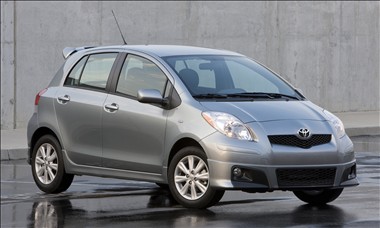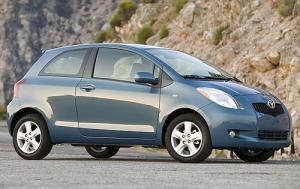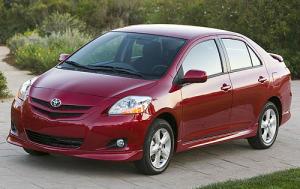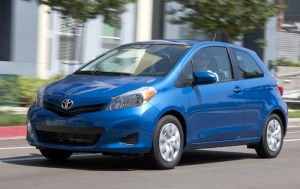
The Toyota Yaris has been a well-regarded subcompact car since its inception, offering efficient use of space, good gas mileage, and typically more affordable pricing.
And due to today's high-priced used car market, many shoppers are looking for "older" models that have aged well as a way to save significant dollars.
And by "older", I am generally referring to 10+ year-old vehicles, so those produced within the Yaris' second and third generations, which covered the 2006 - 2018 model years.
But clearly, prospective buyers must weigh the benefits of affordability and utility against potential drawbacks, such as higher maintenance needs and outdated technologies.
So here, ...
- First, we'll look at what history has proven about the reliability of second and third generation Yaris models (again, 2006 - 2018).
- Then we'll do an overview of both generation's features and characteristics so potential buyers can get to know the vehicle better.
- We'll then list each generation's possible mechanical issues as reported by owners so they can be checked before buying one today.
- And then we'll review the overall pros and cons of buying an older Yaris.
2006- 2018 Toyota Yaris Reliability
The Toyota Yaris is widely regarded as one of the most reliable subcompact cars out there. Across its various generations, the Yaris has consistently demonstrated strong reliability, low maintenance costs, and longevity.
Consistent Reliability: Each generation of the Toyota Yaris has maintained a reputation for reliability. While newer models have introduced more advanced features and technology, the core mechanical reliability has remained stable.
Low Maintenance Costs: The Yaris benefits from relatively low maintenance and repair costs. Routine maintenance is straightforward, and parts are generally affordable and widely available.
Durable Engine and Transmission: The engines, particularly the 1.5-liter inline-four, are known for their durability. Both manual and automatic transmissions have proven to be robust and dependable over time.
Few Major Issues: Across all generations, the Yaris has experienced very few significant problems. Most reported issues tend to be minor, such as occasional electrical glitches or interior wear, rather than serious mechanical failures.
Longevity: According to vehiclehistory.com, a typical Toyota Yaris will last 200,000-250,000 miles with excellent care. This long lifespan is a key aspect of its appeal. But again, "excellent care" is vital, and these are the vehicles you want to identify when buying.
Second Generation (2007 - 2011) Toyota Yaris Overview

Replacing the somewhat bland and undistiquished Toyota Echo, the Yaris was a better vehicle in about every way. Introduced to America in 2007, it wasn't actually the Yaris' first rodeo. In fact, it was already in its second generation and had been Toyota's top-seller in Europe for some years, and for good reason.
You see, its EPA gas mileage ws excellent, getting 35 mpg on the highway and 29 mpg in the city ... among the best at the time and still very respectable today. And I know several owners who've reported long trips coming in in the low to mid 40's.
The Toyota Yaris is a subcompact that can be found as a three-door hatchback, a five-door hatchback, or a four-door sedan. The sedan is actually 20 inches longer than the hatchback (and with a longer wheelbase), which translates into more legroom for rear passengers.
Older hatchbacks, however, can be found with a very versatile optional adjustable rear seat that can move backwards and forewards.
Powering the front-wheel drive Toyota Yaris is a competent 1.5-liter four-cylinder engine that produces 106 horsepower. In this production run, it's mated with either a standard 5-speed manual transmission or an optional 4-speed automatic.
You May Also Like:
Is It The Right Time To Buy A New Toyota?
All About Wholesale Car Prices
The driving experience is comfortable and adequate ... nothing fancy. Overall, it's not particularly "sporty" or "fun". It just gets the job done with enough pull for merging and highway passing.
The steering is light and easy and the turning radius is tight, so it's easy to maneuver. That said, however, the Yaris S, particularly in hatchback form, can be surprisingly peppy.
There's not a long list of standard features, but then again, the Yaris isn't trying to be a luxury vehicle. Standard equipment is fairly sparse, including air conditioning, intermittent windshield wipers, 4-way adjustable front seats, and a tilt steering wheel.
Antilock brakes and side curtain airbags also became standard for 2009, but can be found as an optional feature on some earlier used models.

The better-equipped S model comes with larger wheels with ground-effects styling, a rear window defroster, a 60/40-split-folding rear seat, and a CD/MP3 player.
Most of these features can also be found on some Yaris hatchback and sedan base models that had been outfitted with them as options. Other optional features that can often be found include power windows, power locks, keyless entry, cruise control, alloy wheels, foglamps, a rear spoiler, and an iPod interface.
Older Yaris shoppers should also note that the three-door hatchback S model was introduced for the 2008 model year, while the five-door hatchback made its debut for 2009.
Other significant changes during this production run were minimal. However, the 2010 model year saw stability control become a standard feature on all models, while the S trim was dropped and replaced with an optional Sport package.
Second Generation (2007 - 2011) Toyota Yaris Possible Mechanical Problems
The 2nd-gen Yaris is generally regarded as a reliable vehicle. However, like any car, it had some mechanical issues reported by some owners, which should therefore be included in an inspection before buying one today:
Water Pump Issues: Some owners reported problems with the water pump, which could lead to coolant leaks and potential overheating. This issue was more prevalent in earlier models of this generation.
Suspension Problems: There were occasional reports of worn-out suspension components, such as struts and bushings, leading to a rougher ride and unusual noises from the suspension system.
Brake Wear: Premature brake wear was noted by some owners, including faster-than-expected wear on brake pads and rotors, necessitating more frequent replacements.
Electrical Problems: Minor electrical issues, such as problems with the power windows, door locks, and occasionally the electrical system related to the dashboard lights and instrument panel, were reported.
Manual Transmission Issues: While far from widespread, some manual transmission models experienced issues with the clutch, including premature wear and, in some cases, clutch pedal noise.
Exhaust System Corrosion: In regions with harsh winters and road salt use, some Yaris models experienced rust and corrosion in the exhaust system, leading to potential exhaust leaks.
Third Generation (2012 - 2018) Toyota Yaris Overview

This version is 2.9-inches longer than its predecessor which increased the vehicle's cargo capacity. Other changes include an adjusted suspension tuning for improved handling, some new safety and convenience features, as well as some external styling revisions. The cabin's previous controversial center-mounted gauges were realigned in a more traditional layout.
The sedan version was also discontinued, so this Yaris version is available as a two- or four-door hatchback and in base L and uplevel LE models. There's also a sportier SE model that's available in four-door form only.
Highlights of the L model's standard features include air-conditioning, a trip computer, power door locks, four-way-adjustable front seats, and a stereo system with satellite radio, a CD player and a USB audio interface.
Opting for an LE adds an upgraded audio system, power windows, Bluetooth, a 6-way-adjustable driver seat, remote keyless entry and a 60/40-split fold-down rear seat, while the SE comes with a sport-tuned suspension, four-wheel disc brakes, 16-inch alloy wheels, foglights, upgraded cloth upholstery, a leather-trimmed steering wheel, and a unique front grille.

Once again powering this newer Yaris is a 1.5-liter four-cylinder engine that produces 106 horsepower and 103 pound-feet of torque. It's also still paired with either a standard 5-speed manual transmission or a wildly outdated optional 4-speed automatic.
It's fuel economy remains very good, but has fallen behind several competitors who have upgraded their transmissions to five or six speeds.
That said, the four-speed is quite capable of getting the most out of this engine, producing competent performance around town or merging onto highways. Its overall handling is quite respectable and its surprisingly good grip inspires confidence on those back curvy roads.
Third Generation (2012 - 2018) Toyota Yaris Possible Mechanical Problems
The 3rd-gen Yaris has again been generally well-regarded for its reliability. Still, as with all vehicles, some issues have been reported by some owners, which should therefore be included in a pre-purchase inspection:
Manual Transmission Clutch Wear: Some owners of manual transmission models reported premature clutch wear, necessitating earlier-than-expected replacements.
CVT (Continuously Variable Transmission) Problems: Some models equipped with CVT (2015 and newer) experienced issues such as shuddering, slipping, or hesitation during acceleration. These problems sometimes required transmission fluid changes or software updates to resolve.
Battery Drain: Some owners reported issues with battery drainage, often linked to electrical components not shutting off properly. This could result in a dead battery if the car was left unused for a few days.
Infotainment System Glitches: The infotainment system sometimes experienced glitches, such as freezing or unresponsiveness. These issues often required software updates or, in some cases, replacement of the system.
Suspension Noise: There were reports of noise from the suspension system, particularly over rough roads or speed bumps. This was often due to worn-out bushings or strut mounts.
Steering Column Noise: Some owners noted a clicking or clunking noise from the steering column, often requiring lubrication or replacement of the steering intermediate shaft.
Fuel Pump Failures: A small number of models experienced fuel pump failures, which could cause the engine to stall or not start.
Oil Consumption: There were occasional reports of excessive oil consumption, particularly in higher-mileage vehicles.
Brake Wear: Premature brake pad and rotor wear was noted by some owners, requiring more frequent replacements.
Pros And Cons of Buying an Older Toyota Yaris Today
Toyota Yaris Pros:
Affordability: Yaris models are typically a more reasonally priced used car, and older versions can offer potentially significant upfront cost savings in the current high-priced market for newer used cars.
Depreciation: These models have already experienced significant depreciation, so their value is more stable, resulting in lowering the cost of ownship over time.
Reliability: The Yaris is known for its reliability and low maintenance costs, which can reduce unexpected repair expenses.

Low Maintenance Costs: Parts and service for the Yaris are generally affordable and widely available, which helps keep maintenance costs low.
Fuel Efficiency: The Yaris is known for its excellent fuel efficiency, which can lead to ongoing savings on fuel costs.
Simpler Technology: Having fewer complex electronics and advanced systems compared to newer cars can mean fewer things that can go wrong and lower repair costs.
Safety Features: While not as advanced as the latest models, an older Yaris includes essential safety features like ABS, stability control, and multiple airbags.
Compact Size: Its small size makes it easy to maneuver and park in urban environments. It's ideal for city driving.
Simple and Practical Design: The interior and exterior designs are straightforward and functional, appealing to those who prefer simplicity and practicality.
Toyota Yaris Cons:
Wear and Tear: An older Yaris will likely have higher mileage, and combined with its age, may have a higher risk of repairs going forward, potentially offsetting some of the upfront savings.
Outdated Transmission: Even through the 2015 model year, the automatic transmission remained an outdated 4-speed. While adequate and still fuel efficient, a more modern transmission would have performed even better.
Technology and Infotainment: Although newer models have improved, the Yaris has traditionally lagged behind competitors in terms of advanced infotainment and technology features.
Fewer Advanced Safety Features: It may lack advanced driver assistance features such as adaptive cruise control, lane-keeping assist, and automatic emergency braking.
Limited Space: While the Yaris is compact and easy to maneuver, it also means less interior space. Taller passengers might find the rear seats cramped, and the cargo space is limited compared to larger vehicles.
Performance: The Yaris is not known for its powerful engine or sporty performance. It may feel underpowered, especially on highways or when carrying a full load of passengers and cargo.
Noise Levels: The cabin can be relatively noisy, especially at higher speeds. Road and engine noise might be more noticeable compared to some competitors.
Material Quality: The interior materials, while durable, might not feel as premium as those found in some rivals. There can be a lot of hard plastics.
Ride Comfort: The ride can be a bit firm, which might not be as comfortable on rough roads. The suspension setup prioritizes handling over comfort.
 By Josh Rosenberg
By Josh Rosenberg